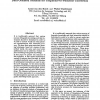Free Online Productivity Tools
i2Speak
i2Symbol
i2OCR
iTex2Img
iWeb2Print
iWeb2Shot
i2Type
iPdf2Split
iPdf2Merge
i2Bopomofo
i2Arabic
i2Style
i2Image
i2PDF
iLatex2Rtf
Sci2ools
108
click to vote
EACL
1993
ACL Anthology
1993
ACL Anthology
Data-Oriented Methods for Grapheme-to-Phoneme Conversion
It is traditionally assumed that various sources of linguistic knowledge and their interaction should be formalised in order to be able to convert words into their phonemic representations with reasonable accuracy. We show that using supervised learning techniques, based on a corpus of transcribed words, the same and even better performance can be achieved, without explicit modeling of linguistic knowledge. In this paper we present two instances of this approach. A first model implements a variant of instance-based learning, in which a weighed similarity metric and a database of prototypical exemplars are used to predict new mappings. In the second model, grapheme-to-phoneme mappings are looked up in a compressed text-to-speech lexicon (table lookup) enriched with default mappings. We compare performance and accuracy of these approaches to a connectionist (backpropagation) approach and to the linguistic knowledge-based approach.
EACL 1993 | Linguistic Knowledge | Linguistic Knowledge-based Approach | Natural Language Processing | Supervised Learning Techniques |
| Added | 02 Nov 2010 |
| Updated | 02 Nov 2010 |
| Type | Conference |
| Year | 1993 |
| Where | EACL |
| Authors | Antal van den Bosch, Walter Daelemans |
Comments (0)

